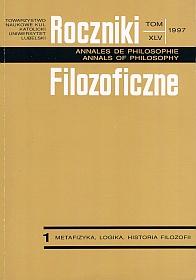Pre-conscience (synderesis) and Conscience (conscientia) as Expressed by Saint Thomas Aquinas
Abstract
The „pre-conscience”, as seen through Saint Thomas is a naturally given, practical ability which leads us towards the right. Following the above, the „pre-conscience” is understood as a „natural ability of the primal principles of behaviour” (primum principium operabilium). Natural ability means, that the pre-conscience is not acquired as it is with the other abilities but it makes for a pure nature of an intellect itself – in respect to human behaviour. An intellect which directs and manages our conduct, induces us towards the right. The „conscience” thus, is a practical aspect of our intellect, formed upon the moral discernment acquired by the given individual. It acts as a „witness” of our behaviour while we act, commits us to take up actions, which are due to be taken and judges all committed dids. The Saint Thomas'es approach to the issue of „pre-conscience” may induce to compare it with the theory of „heart speech” and particularly with a „word of heart” – an element of above and the whole issue of a „natural desire” and natural love feeling – resulting from above. Comparing the above mentioned conceptions, one may draw a conclusion – that the „pre-conscience”, the „word of heart” and „natural desire”, are – if not identical than at least they remain in the reason-result dependence chain. The first result of an influence of principles of being over abilitual intellect – is an appearing understanding (intellectio), which makes for specific stimulus, pushing us towards further actions of a mental capabilities of any human being. It seems, that in respect to the issue of cognitive problems – that „stimulus” is called by Saint Thomas as a „word of heart”. In respect to the issue of antropological problems – the same „stimulus” is understood as a „natural desire” (appetitus naturalis). Therefore, within the scope of moral problems – the „word of heart” (either its intellectual reason) is called the „pre-conscience”.
The above said, may induce us to the further searchings within the works of Saint Thomas for the grounds of a moral concept of a human being and the frames of the ethics, resulting from it. The ethics, which as a philosophical moral science, in accordance with its nature – searches for rules and principles shaping and limiting the sense of moral. The key for that science is the issue of contemplation, which, as Saint Thomas says – „gives the birth” to knowledge, wisdom and „eagerness towards right”. I means that pre-conscience, contemplation and wisdom can work inside us as the set of ethical principles, determining our conduct.
Copyright (c) 1997 Roczniki Filozoficzne

This work is licensed under a Creative Commons Attribution-NonCommercial-NoDerivatives 4.0 International License.





